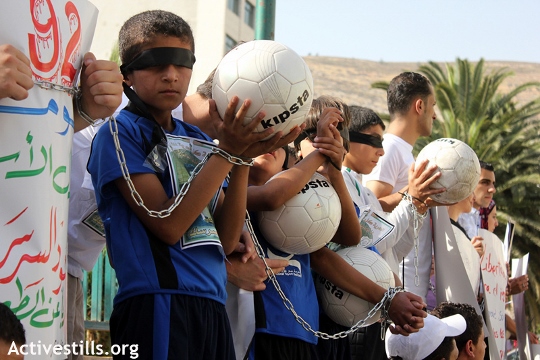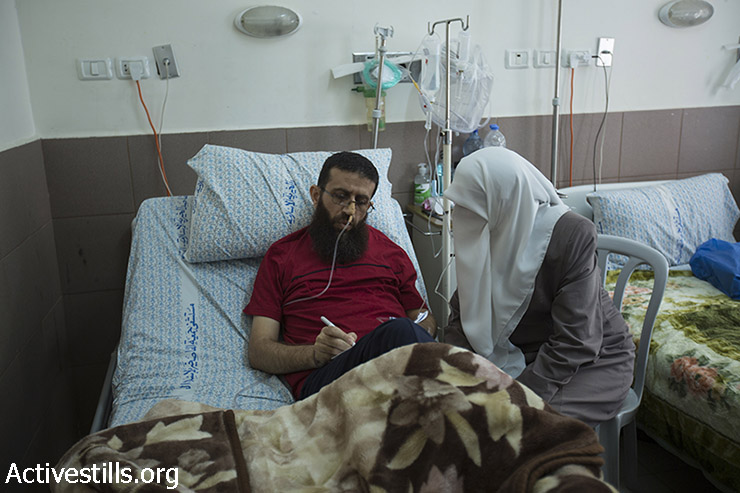We have become so accustomed to the idea that detaining people without charge or trial is fine. So much so that the discussion now revolves around how we should allow them to die, rather than why we have reached this point in the first place.
By Yael Marom and Noam Rotem

It may be true that Attorney Mohammed Allan, who has been on hunger strike against his administrative detention for the past 54 days, is a bloodthirsty criminal. It may be true that Meir Ettinger, who was put in administrative detention last week, is the source of all evil in the world. But if this is true, let the army, the police, or the Shin Bet produce evidence agains them. They will go to court, be served with an indictment, and stand before the judge. This is how it works in a country that pretends to be democratic. A person is innocent until proven guilty.
The use of administrative detention, in which a detainee is held indefinitely without trial or charge, can only be deemed legal in very extenuating circumstances — a last resort to prevent potential danger. Israel is currently holding approximately 400 administrative detainees in its prison. Throughout the years, the majority of administrative detainees were not arrested as “ticking bombs,” but rather as leaders of organizations or communities (political prisoners) or as a replacement for criminal proceedings in which the state prefers not to reveal the evidence against the detainee. Sometimes, administrative detention is used as a threatening, arbitrary measure of the occupation. Some families of detainees describe, whether jokingly or not, that their sons were arrested as part of a “deal” with the Palestinian Authority, which seeks to get rid of them without paying the political price for doing so.
The main collaborators in Israel’s excessive use of administrative detainee are the courts. Those that are meant to be the gatekeepers are willing to be the rubber stamp for procedures that are clearly not up to the standard of the law, not to mention justice. At best, those in the justice system clean their consciousness years later through films or signing hollow petitions. In real time, however, they may express discomfort, while continuing their closed-door discussions to approve the disproportionate use of administrative detention.
The injustice is all the more apparent when the detainee nonviolently struggles against his detention without trial, or when a petition is filed the court, and the state decides to release the detainee, who just moments ago was deemed a danger to the state.
The medical teams in Barzilai and Soroka hospitals, respectively, are now showing the justice system what a real commitment to medical ethics looks like. Their refusal to force-feed administrative detainee Mohammad Allan in a country where public courage is a rare commodity nowadays is commendable. Some are refusing out of a belief in the ethics of medicine, while others are afraid of being marked internationally as those who took part in a procedure that is considered a form of torture. Furthermore, we must not forget about the economic impact on hospitals once donors refuse to give money to an institution that cooperated with the torture of political prisoners.
In this situation, administrative detainees have several options: to accept their fate, pray for a prisoner exchange deal, use violence in order to bring about a prisoner exchange deal, or use nonviolent protest tactics and refuse to eat, out of the belief that their choice is between freedom and death.
Hunger strikes by Palestinian detainees are inherently political. Their goal is to put enough pressure to cause a change in policy — whether on an individual or collective level. Often times their goal is to improve the conditions of all detainees, and in the case of administrative detainees, they seek to put enough pressure on the authorities in order to be brought before a judge and be tried, or be set free.
Palestinians did not invent the concept of hunger strikes; this is a nonviolent tool that has been used across the world since time immemorial. Political prisoners go on hunger strike for ideological reasons or when they want to improve their conditions.
Read: I was force-fed six times — in a Soviet prison
One of the most well-known hunger strikers was Bobby Sands, who died in 1981 after a 66-day strike against the conditions of Northern Ireland prisoners in British jails. Among the lesser known hunger strikers are the nearly 100 Turkish prisoners who starved to death in the beginning of the century. Rabbi Michael Rivkin, who before immigrating to Israel at the end of the 1980s was a human rights activist in the Soviet Union and belonged to a group of dissidents in Moscow, went on hunger strike for his prolonged detention without trial and was force-fed by the authorities. The same goes for some of the Muslim prisoners in Guantanamo Bay.
In Israel, Khader Adnan was recently released from administrative detention after 56 days of hunger strike. In the past, dozens of hunger strikes by Palestinian prisoners ended in various degrees of success. In four cases the prisoners died as a result of force-feeding.

But the hunger strike itself, whose use is legitimate, is not the focus of the discussion, or at least shouldn’t be. We have become so accustomed to the idea that detaining people without charge or trial is fine, that the discussion now revolves around how we should allow them to die, rather than why we have reached this point in the first place. Muhammad Allan is willing to put his life on the line so that we have an easier time talking about the unacceptable practice of administrative detention, not about the width of the needle or the best way to insert a feeding tube into his throat. We are protesting against the justice system that is imprisoning him without even letting him know why, without telling him when he will be released or whether he will ever be put on trial.
The state is trying dealing in risk management. The good of the prisoner is not taken into account, only the potential damage to Israel’s hasbara (Hebrew for Israeli PR or propaganda) efforts. The calculus goes a such: will the death of a Palestinian prisoner cause more damage than the use of force-feeding, a procedure that the enlightened world views as unacceptable, and which will mark Israel as a country that supports torture? According to Palestinian organization Addameer, since 1967 until today, 207 Palestinian prisoners have died as a result of hunger strikes in Israeli prisons. Israel’s hasbara experts are probably asking themselves: will another Palestinian prisoner tip the scales?
The rebellion by Israel’s medical establishment will be remembered as a bright spot in a dark time, when people stood up and refused to take part in oppression and humiliation. But they aren’t the ones who must stand at the forefront of this struggle. The real battle belongs to the administrative detainees who are fighting the occupation. As long as any one of us can be locked up without charge or the ability the defend ourselves — none of us are safe.
Yael Marom is Just Vision’s public engagement manager in Israel and a co-editor of Local Call. Noam Rotem is an Israeli activist, high-tech executive and author of the blog o139.org, subtitled “Godwin doesn’t live here any more.” This article was first published in Hebrew on Local Call. Read it here.

